In National Geographic’s Before the Flood, director Fisher Stevens and Leonardo DiCaprio (who narrates the documentary) tackle a global issue that is causing worldwide devastation – climate change. They hope the film sparks a call to action and serves as a wake-up call. Before the Flood will screen as part of the new Air, Land & Sea category at the Hamptons International Film Festival, and we caught up with Stevens to discuss the importance of the election, working with Leo, climate change and much more.
What made you want to make this film?
FS: I’ve made a bunch of films dealing with climate change – the last one was “Racing Extinction” which covered some of the same ground, but I think I have to keep getting this message out as much as possible because it’s just so important to me and I also have young kids. When Leonardo [DiCaprio] called and asked me to work with him on this, I thought he’d be a great Messenger of Peace, literally, a messenger of climate change and the importance of the issues. I thought, why not keep the journey going with another film? I want to keep the message out and I thought Leonardo is the perfect person to take it to the next level to make sure that everybody understands how important this issue is, especially with the election. We knew in 2016 there’d be a presidential election because we started this movie three years ago. Our goal was always to get it out before the election.
So it’s no coincidence that the film is being released right before the presidential election?
FS: One of our deals with Nat Geo was to release the film before the election and they were totally on board with that. That’s why it’s coming out on television on October 30th.
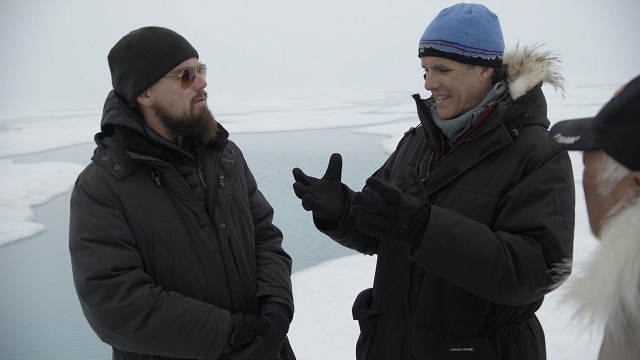 |
|
Leonardo Interview with Enric Sala about meltwater. (Photo: RatPac Documentary Films, LLC and Greenhour Corporation, Inc.) |
Do you feel that since Leonardo DiCaprio is involved, that will result in a bigger audience reach?
FS: That’s the idea. We both knew a lot about this issue and he knew a lot because he’s been into this since 1999. It’s been his passion and he’s never really been in a movie where he wasn’t saying someone else’s words – where he had to be himself, and he was willing to do that, so that’s why, hopefully, we’re going to get reach, and why we’re lucky enough to get a lot of these people – like the Pope and President Obama – in the film.
How did you decide which countries and leaders to include?
FS: We knew there were certain issues, like we knew we wanted to deal with the belt – the melting of the ice, and there’s really two places to go, either Antarctica or the Arctic. We also wanted to go to Greenland. Greenland is near the Arctic and we didn’t have time to go everywhere, but Leo’s foundation had been supporting a project in Greenland, so we were in contact with Jake Awa, who’s in the film, and we were in contact with Enric Sala, who’s in the film, so we coordinated when Leo had a few weeks off The Revenant to go to the Arctic and Greenland in one trip because those two guys happened to be there at the same time. We didn’t know how we would illustrate it. We just got lucky, in terms of there was a hose that had been planted five years earlier, it was a great illustration for the world to see how much has been melting in Greenland. That kind of surprised us and terrified us. Leo spreads this hose that was buried under the ice five years ago and now 30 feet is just completely melted out. In terms of other places, we knew that the palm oil was a huge problem and the deforestation in Sumatra, and the fire burnings of the rainforest. So, again, through people I knew and Leo knew, we went to this place called the Leuser Ecosystem, because that’s one of the most devastated places where deforestation is happening. We could have also gone to other places. We actually did go to Ecuador into the Amazon, and that scene will hopefully be seen somewhere else. We couldn’t keep everything in the movie, we shot so much. We could have made this movie for years. If the election wasn’t coming, who knows if we would have been able to finish on time. The election forced us to get this thing out there.
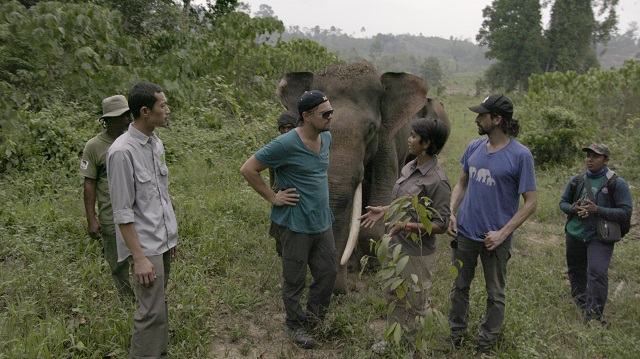 |
|
Leonardo with Farwiza Farhan and Rudi Putra in the Leuser Ecosystem. (Photo: RatPac Documentary Films, LLC and Greenhour Corporation, Inc.) |
Do you think you’ll make a follow up?
FS: I don’t know, but Leo and I will still keep working in this area – either together or separately. The election is a huge deal because one of the candidates doesn’t even acknowledge that climate change is real.
It appeared as though there’s a real struggle to properly address climate change and how to reverse it because of corruption. Would you agree?
FS: Yeah. Part of the thing we show is a lot of these climate deniers are climate deniers because their campaigns are being funded by the fossil fuel industry. I think if people start to understand that, they’ll push leaders to change their ways. The other thing we say in the film is that politicians follow the people, so it’s up to us to push the politicians in the right direction. Right now, you can’t push a politician in the right direction if you don’t understand what’s going on. That’s part of our goal with this film, to enlighten our audiences to know that a lot of these politicians are on the take from the oil companies.
The Paris Agreement seemed like a monumental step in the right direction, but the question remains will those who signed it actually keep to their promise? Have you followed the progress of the Agreement since it was signed last year?
FS: It was really was just ratified by China and Obama in the last few weeks, officially. A lot of it doesn’t really go into play until 2020, but again, if Donald Trump becomes president, he can try, I don’t know if he can do anything, but he can try to then change the course of the Paris Agreement. So far, it’s looking really good. Most of the countries are on board. Already there have been good steps, and you can see it in the marketplace, alternative energy is doing better, the stocks are doing better. A lot of this is based on economics. I think one of the big things is that the banks have to understand that they need to stop loaning huge amounts to the fossil fuel industry and start loaning huge amounts to the solar and wind companies and a lot of that is because of this Paris Agreement. It’s really pushed things forward in that direction and it seems to be already working in a positive way. But, like Obama says in our film, it doesn’t go far enough even for what the scientists are telling us. We’ve just this week went over 400 parts per million of carbon in the atmosphere. Things are getting worse right before our very eyes.
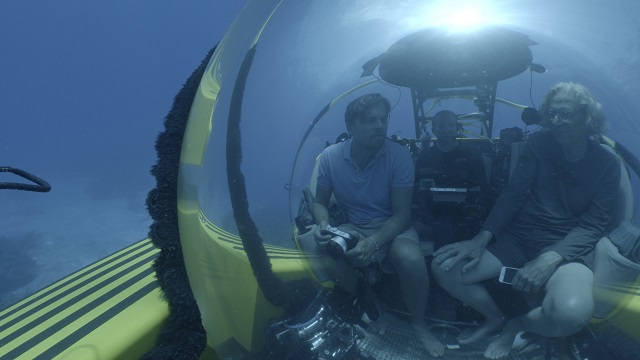 |
|
Leonardo diving with Jeremy Jackson discussing the oceans. (Photo: RatPac Documentary Films, LLC and Greenhour Corporation, Inc.) |
When you hear Elon Musk speak about a Gigafactory and how the world would only need 100 to see a significant positive change – does it give you hope for the future?
FS: That would be amazing, but it’s not just so easy to make a Gigafactory. As he said in the movie, Tesla had trouble just doing one. So it’s going to take huge corporations understanding that they can make a profit by having Gigafactories to make this happen. Elon Musk is a good example of someone who’s moving the needle in a very good direction, and also getting very wealthy by doing it, which is why we wanted to include him in the film. He’s a broad thinker, and believes that climate change is real and happening, and he is one of the people that can hopefully move us to do the right thing. He also wants to send people up to Mars because he’s a bit worried about what’s going on down here. But, that Gigafactory is incredible and it is so impressive and the fact that he is able to change the way that we store power with batteries is a huge step in the right direction.
What would you say to people that deny climate change is happening?
FS: I say watch our film because we prove that it is happening. It’s kind of hard to deny it when you see what’s happening on a daily basis. Read papers, read scientific research and get the facts from other places besides Fox News.
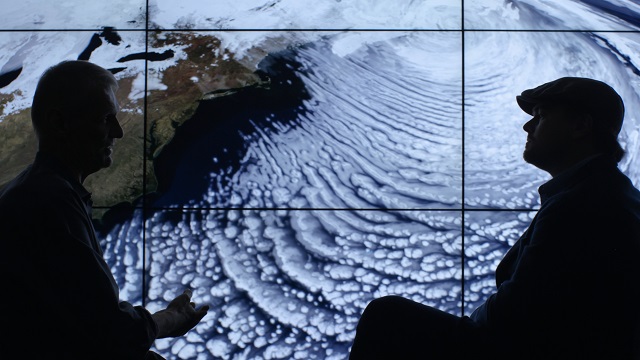 |
|
Leonardo Interview with Piers Sellers at NASA. (Photo: RatPac Documentary Films, LLC and Greenhour Corporation, Inc.) |
Were you or Leonardo surprised at anything you learned?
FS: In a good way, we were surprised at how quickly battery storage and solar and wind technology is moving and how many countries are embracing the technology. I was also very surprised to learn that we can transition much faster than I had originally thought when I started making the film – in terms of wind. But then on the flip side, I was surprised by the way we consume, just even buying a bag of Doritos has an impact on the rainforest in Indonesia because of the palm oil. I was surprised at the amount of extraction going on all over the world for everything – the fact that there’s only 20 percent of rainforest remaining – I didn’t know that. The rate of the melt in Greenland was very shocking to me. I was also surprised at how easy it was to find out about the Senate and Congress, about how much they were taking from the fossil fuel industry, and how it’s just online – so easy and accessible. A lot of these guys believe in climate change, but they just want to stay in power so much that they are willing to deny it against their better principles. A lot of them, it turns out, really do believe in it, they just also believe in needing money to run their campaigns.
A carbon tax was also discussed in Before the Flood. How realistic do you think the tax is?
FS: I think if Donald Trump is elected, it won’t be realistic at all. Even ExxonMobil knows that they’re going to have to change their ways. They’ve been coming out in favor of a carbon tax. And The New York Times just did a poll that basically said that more Americans are in favor of a carbon tax than not. That was a pretty shocking statistic. Because of the fact that climate change is starting to become a big part of the conversation, a carbon tax is, as Elon Musk says, the faster and most effective way to curb emissions. Part of Bernie Sanders’ campaign was pushing a carbon tax. Hillary has not come out in favor of it, yet. Realistically, will it happen in the next four years? I’m not sure, but, I believe for sure in the next eight years. It has to happen because if there’s a couple more Hurricane Sandys or something like that, I think every time we have a natural disaster and they get more and more intense, people start to understand the severity of this issue. I just hope it doesn’t take another something like that to make people really get it. That’s why we’re making these movies.
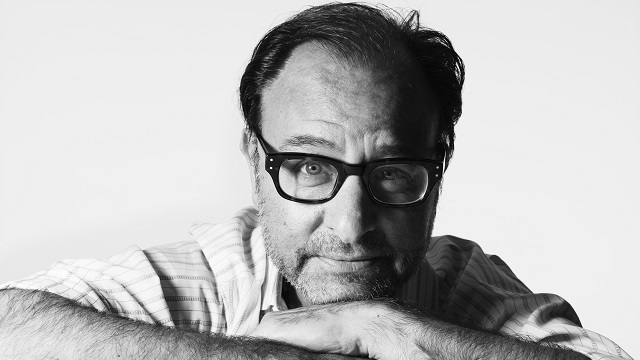 |
|
Before the Flood director Fisher Stevens. (Photo: RatPac Documentary Films, LLC and Greenhour Corporation, Inc.) |
What do you hope people take away?
FS: Well, we do this kind of call to action at the end. The biggest thing right now, if you’re living in the United States, is to vote for people – whether it’s your congressman or senator or president – who believe that climate change is a big issue. It’s also to change the way we consume. We get into meat consumption, we get into palm oil consumption, and to think about your own consumption level. You can download the app (www.oroeco.com) and you can learn about your own carbon footprint and you can pay your own voluntary carbon tax that will go towards reforestation. So we’re hoping people download the app and go online to www.carbontax.org. And then, basically, just hope that people start to talk about it and make it part of the daily conversation so they live their lives more conscientious about the fact that there’s 7.5 billion of us here and we all want to make this planet habitable as time goes on. So it’s more about waking people up and starting a movement and telling your politicians that this is a big issue. I just hope that, as Leo says in the film, people who roll their eyes when they hear about it, now they start getting involved and start doing something about it.
Before the Flood will screen at the Hamptons International Film Festival on Saturday, October 8th at 12 p.m. at Guild Hall (158 Main Street, East Hampton) and Sunday, October 9th at 12 p.m. at UA Southampton 4 Theatres (43 Hill Street, Southampton). For tickets, visit hamptonsfilmfest.org.
To watch the Before the Flood trailer visit nationalgeographic.com.












